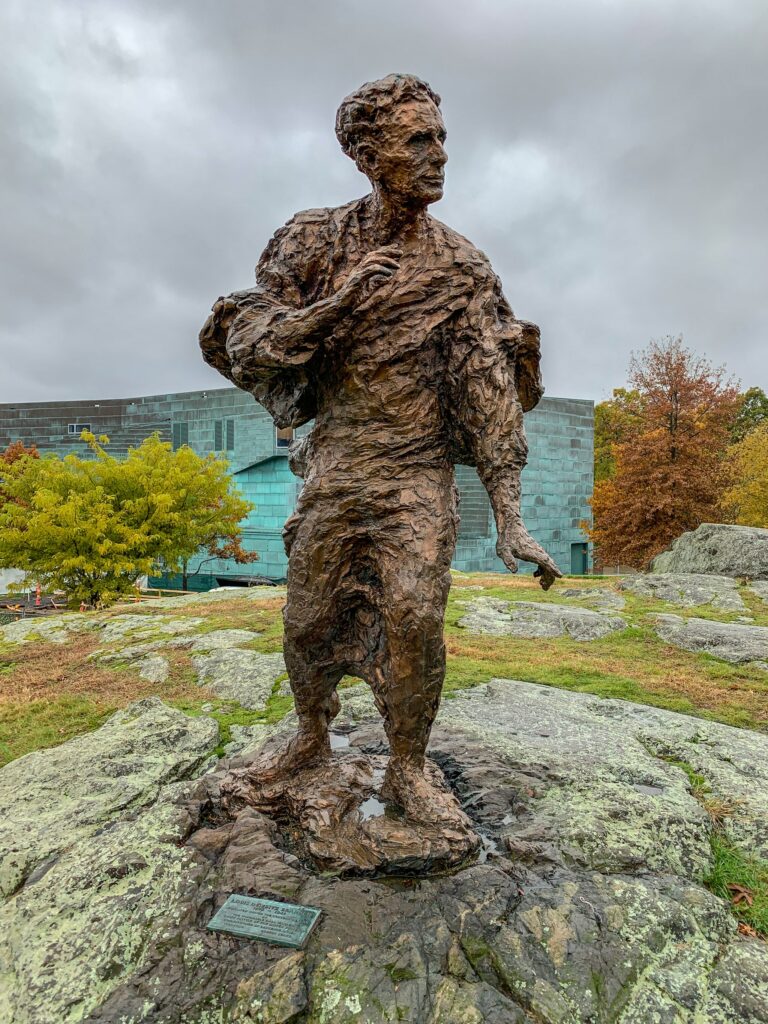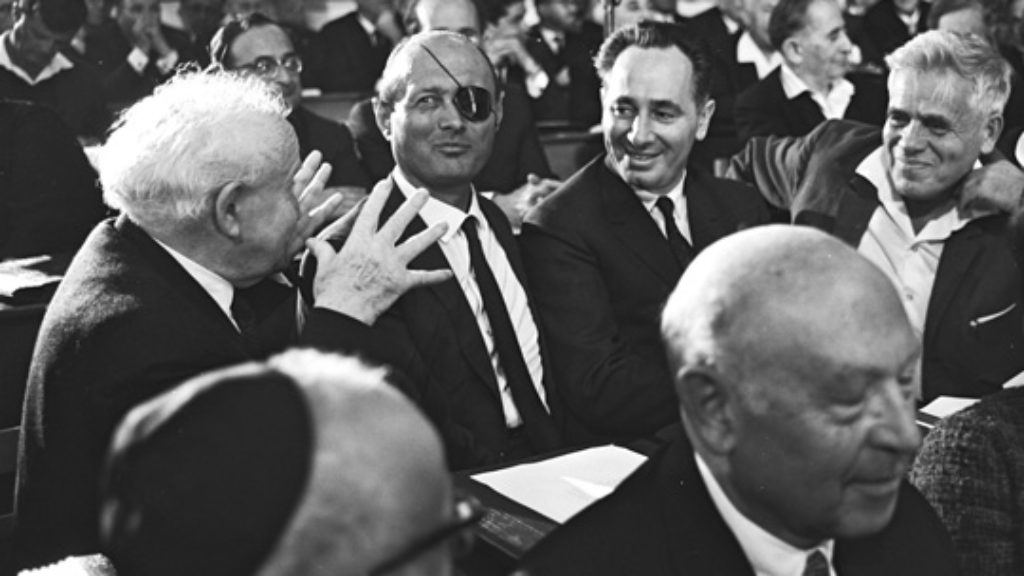Waltham Intellectuals
When the New York intellectual Irving Howe came to Waltham, Massachusetts, in 1953 to be interviewed for a position at Brandeis, he didn’t have his hopes up. He was “worried that his membership, however nominal, in a tiny neo-Trotskyist sect might scuttle a chance for secure academic employment.” Instead of giving a job talk, he sat down for a conversation with the dean of the humanities, the Russian-born, Sorbonne-educated literary scholar Joseph Cheskis, the historian Frank Manuel, “the Judaic scholar Simon Rawidowicz, and the novelist and critic Ludwig Lewisohn, plus a few scientists.” As Howe later recalled, things weren’t going well until he casually mentioned that he was working on an anthology of Yiddish stories in English translation. At that, “Faces broke into smiles.” “Suddenly the conversation switched to Yiddish, as Rawidowicz challenged the candidate’s high estimate of the literary caliber of Isaac Leib Peretz. ‘I relaxed happily,’ Howe added.” Afterward, he wondered “whether any other ‘professor of English in the country . . . can say that his first job interview was conducted in Yiddish.’”

If his interview hadn’t taken such a fortuitous turn and Howe hadn’t gotten the job, the Jewish Review of Books might have a somewhat different editorial board. One of its members, Michael Walzer, whom Whitfield identifies as one of two most important political theorists to graduate from Brandeis (the other is Michael Sandel), enrolled there in 1952 because he didn’t think that he could get past the discriminatory barriers still restricting the admission of Jews to places such as Harvard and Yale. Walzer thrived at Brandeis. After taking a humanities survey course with Howe, he told his parents he didn’t want to be an attorney anymore: “he ‘wanted to be an intellectual’ like Howe, whose course thus became the sophomore’s gateway drug into the high of thinking and writing.”
Learning on the Left is full of such stories. Stephen Whitfield’s group portrait of a large number of men and women of the Left who taught and studied at Brandeis from its inception at the end of the 1940s to the present is as attentive to the personalities of his subjects as it is to their ideas. A gifted, prolific, and celebrated scholar of American and American Jewish history, Whitfield earned his PhD at Brandeis, taught there for 44 years, and has now written a nearly 600-page book about some of the best-known people associated with the institution. But he also makes it clear that if you attended Brandeis after the sixties were over, you might easily have done so without having much contact with the world he shows us, which rings true for me.
I had been tempted to apply to Brandeis as an undergraduate in the late 1960s but was talked out of doing so by the Brandeis professor who led the summer program that I had attended at Hampton Institute (as it was then called) in Virginia during the summer before my senior year in high school. “You’re too Jewish already,” said the American historian Ray Ginger (who, I learned from this book, had come to Brandeis after being forced out of the Harvard Business School in 1954 for refusing to acknowledge whether or not he was a communist). When I came to the university a decade later, as a graduate student in the Department of Near Eastern and Judaic Studies, I had few brushes with Whitfield’s cast of characters. Of course, I knew about Irving Howe, Herbert Marcuse, and the others who had once been around. But the people I studied with scarcely show up in Whitfield’s book. I did learn that one of my favorite professors, the historian of Zionism Ben Halpern, had a few years before my arrival been Thomas Friedman’s undergraduate thesis adviser, but that is just about the only significant mention of anyone I knew at the university.
The Waltham Left Whitfield describes was anything but uniform and cohesive. Marcuse is one of the people he names most often, and he gives extensive attention to the Brandeis students, such as Angela Davis, this world-famous philosophical icon of the New Left influenced most strongly. But on the whole, he is less concerned with this branch of the Left than with more moderate figures, social democrats like Howe and Walzer, and the liberals to the right of them, such as Max Lerner, John P. Roche, and Martin Peretz.
As a professor of politics and the first head of the university’s graduate program, the academically trained veteran liberal journalist Max Lerner played a significant role in shaping the university in its first decade. He owed his job, to some extent, to Supreme Court Justice Felix Frankfurter, who had urged President Abram Sachar to hire him to get him out of the newspapers and into more serious work. At that, Whitfield reminds us, Frankfurter didn’t entirely succeed. Lerner wrote nearly 2,000 columns during the decade he taught at Brandeis.
Lerner’s earlier attempts to enter academia had been derailed by antisemitism. A professor of English at Yale once derided him, for instance, in a letter of recommendation, as a “rather short and not in the least good-looking” Jew. Nevertheless, as Whitfield relates, he possessed a certain magnetism. In 1959, when the legendarily beautiful actress Elizabeth Taylor married her fourth husband, the Jewish singer Eddie Fisher, much of the press condemned her for breaking up his previous marriage, Lerner stood up for the star and her new husband. “The newlyweds were so struck by the Post column that they invited Lerner to London, where (according to an interview he gave to a Taylor biographer) ‘Elizabeth was her usual seductive self, and I fell in love.’” The secret affair between Lerner and the woman who called him “my little professor” lasted until 1961.
Lerner’s colleague Ludwig Lewisohn thought he was “very charming, intellectually agile, cultivated, sensitive, good-humored. All that.” But, he lamented, he didn’t “realize that leftism was a delusion (‘Utopian escapist hopes’).” Lerner, for his part, considered himself to be quite pragmatic and thought that Marcuse was the utopian. But that was all right. “For the real folly of our time,” he wrote in a friendly review of his Eros and Civilization, “is the cynicism and tiredness that have made us forget how to dream and act out our dreams.”
Whitfield doesn’t tell a story of fierce hatreds and rivalries. But there were significant differences among the leftists who taught there, and some of them played themselves out in the lives of their students. In 1970, Herbert Marcuse called Angela Davis (Brandeis ’65) “the best student I ever had in the more than thirty years I have been teaching.” She was his student not only as an undergraduate but at the University of California, San Diego, where he continued his career after his mandatory retirement from Brandeis. “Herbert Marcuse taught me,” she recollected in a 2007 television interview, “that it was possible to be an academic, an activist, a scholar, and a revolutionary.” What her mentor thought of her politics is unclear, Whitfield tells us, “though her decision to become a Communist probably didn’t thrill him.” In any case, he didn’t become disenchanted with her after she was accused of involvement in the bloody takeover of a courtroom by the “Soledad Brothers” in Marin County in 1970. “Marcuse contributed to the bail fund of his most famous student, submitted affidavits on her behalf, and, with his wife, Inge, visited Davis several times in prison.” He wrote her an open letter in which he praised the way she had translated what she had learned in her years of study into reality.
Following her acquittal in 1972, Whitfield writes, “Davis seems not to have expressed any remorse for the deaths resulting from the weapons that she had acquired. At least in public, she was neither sorrowful nor repentant.” Despite her later success as one of the most famous African American women in academia, Whitfield strongly doubts the value of her work. “Davis’s oeuvre,” he writes, “veers frequently into agit-prop. It is so lacking in reflectiveness, or an effort to formulate first principles, or a desire to meet legitimate contrary arguments, that she satisfies the working definition of an ideologue. To call her ‘one of the major political theorists of the second half of the twentieth century,’ as Harvard’s Henry Louis Gates, Jr., did, is therefore absurd.”
If Max Lerner had a favorite student at Brandeis, Whitfield doesn’t tell us who it was. But he does tell us a lot about a student he strongly influenced: Stephen J. Solarz (Brandeis ’62), the only alumnus of the school ever elected to the US Congress (Democrat, New York, 1975–1993). When Solarz was a senior, he regularly drove Lerner from the campus to Boston’s Logan Airport and back. Lerner was for him “a role model of the politically engaged intellectual,” he later said, “and it was from him that I learned the importance of ideas in politics.” Whitfield devotes 10 pages to a description of Solarz’s stalwart defense of human rights around the world during his nine terms in the House of Representatives. During his first year in office, “he co-sponsored an amendment requiring the Department of State to submit a human rights evaluation of any country entitled to annual security assistance.” He worked intensively on behalf of Syrian and Russian Jews and led the Congressional effort to impose sanctions on the apartheid regime in South Africa. In the Philippines, he was, in the words of Senator Daniel Patrick Moynihan, “instrumental in bringing off one of the genuine triumphs of democracy we have seen in our lifetime.”
There were, then, starkly different ways for Brandeis students to learn on the left how to conduct themselves in the world in the second half of the 20th century, and some of them were better than others. Whitfield’s aim is not so much to make this point as to tell a story, a big one, about the university in which he spent his entire adult life. Only someone who saw what he saw could tell it the way that he has.
Suggested Reading
Politics and Anti-Politics
Michael Walzer asks new questions of the biblical text, the same sorts of questions we often ask of Locke or Voltaire.
With Interest
Have the Jews been capitalism's best friends or worst enemies, or both?

Paradox or Pluralism?
Walzer’s paradox of liberation, if that is what it is, is that religion is back, or that despite the extraordinary success of secularizing revolutionaries it never quite went away.

The Devil You Know
Alvin H. Rosenfeld in 2013: “How aggressive this new antisemitism is likely to get and, ultimately, how destructive it will be if it proceeds unchecked are open questions.”
Comments
You must log in to comment Log In